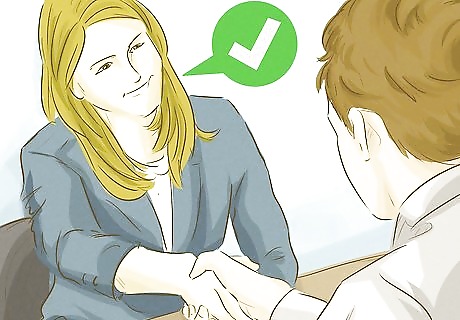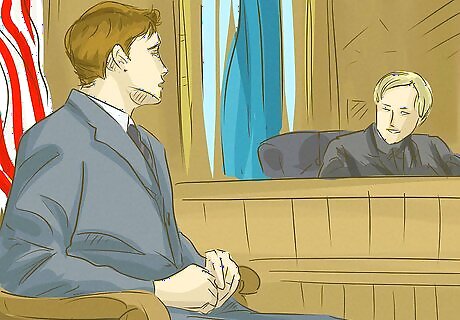
views
Ending a Coaching Contract for Convenience

Find your contract. Your coaching contract should tell you how to terminate the contract for convenience. When you terminate for convenience, you usually have to pay the other side money. However, if you pay the money, you can get out of the contract. Find your copy of the contract by going through your papers or your filing cabinet. If you can’t find your copy of the contract, then ask the other side if you can have a copy. Simply say that you have misplaced your copy and need a new one.

Read the termination provision in the contract. The contract should contain a “termination” provision. This provision will state what happens if either side ends the contract before the expiration date. You should read this provision to understand your obligations. For example, if you are the coach, then you might have to pay the school a lump sum of money to cover the costs of recruiting a new coach to replace you. After you pay the money, you can terminate the contract. If you are the school, then you will probably have to continue to pay the coach’s salary and benefits for the remainder of the contract term.

Analyze whether you want to end the contract for default. You can also try to end the contract “for default,” which also means “for cause.” For example, the school could claim that the coach violated the contract. If you dismiss a coach for default, then you don’t have to pay the coach any money. Ending a contract for default is a different process. You have to identify how the other side violated the contract. Then you have to send a breach of contract letter to the coach. Ending a contract for default usually invites a lawsuit. Accordingly, you should analyze whether you might be better off just paying the coach the remainder of his or her salary. For example, if the coach has one year remaining on the contract, then you could pay the one-year salary. This amount could be less expensive than the cost of defending yourself in a lawsuit. If you don’t know whether to end the contract for convenience or for default, you should talk to a lawyer.

Talk informally with the other party. Before ending the relationship, you should talk with the other side. Set up a meeting and discuss why you want to end the contract for convenience before the expiration date. For example, you might have received an offer to coach at a more prestigious athletic program. A high school coach might have received an offer to coach at a college or university. In this situation, the coach might want to leave early to advance her career. A school might also want to end the contract early if the coach is not winning enough games.

Write a resignation letter, if required. Your contract might require that the coach submit a resignation letter in writing. Discuss the resignation date with the school and make sure to date the letter accordingly. Keep the letter professional. Do not attempt to set the record straight or complain about people in the organization. Instead, express your appreciation for the chance to coach the team. Only list reasons for resigning if they don’t reflect badly on the team. For example, if you are a high school coach who has accepted a college-level position, then you could write, “To advance my career and develop as a coach, I have decided to accept an assistant coaching position at the University of Minnesota.” It does not reflect poorly on a high school if someone leaves early to coach in college. The school might want to look at the letter since it could be released to the media. In order to preserve a good relationship with the school, you should let them review the letter and take their suggestions for revising it.

Make sure the coach finds other employment. Your coaching contract probably contains a provision that the coach must make a "good faith" effort to find other employment after being let go. This is called “mitigating damages.” For example, you might have asked the coach to leave. Under the contract, you agree to pay the coach the remaining salary due under the contract. However, the contract also requires the coach to make a “good faith” effort to find another job. If he does, then you can deduct the new salary from the amount you are obligated to pay. You should send the coach job opening notices. You can also ask the coach to show you a written log of jobs he or she has applied for. A coach should keep these kinds of records.
Terminating the Coaching Contract for Default

Identify “for cause” reasons for terminating the contract. You can end a contract for default if the other side fails to fulfill its obligations. In the context of a coaching contract, the school usually will want to end the contract for default. Although a coach can also terminate for default, the school has fewer obligations under the contract and therefore is less likely to breach. You should read the contract, which should give detailed reasons why a school might terminate a contract “for cause”: The coach commits an act of violence, regardless of whether criminal charges are filed. The coach is convicted of a felony. The coach violates the policies of the school or the governing athletic association. Also, the coach might condone violations from subordinates, such as assistant coaches and student coaches. The coach gambles on sports. The coach does not carry out his or her duties under the contract. For example, the coach might not recruit players or participate in media, as required by the contract. The coach commits any act which brings embarrassment to the school and reflects adversely on the school’s reputation.

Collect proof of the contract breach. Your focus when ending a contract for default is to support your decision so that you can either avoid a lawsuit or win a lawsuit if the coach sues you. Accordingly, you need evidence that the coach broke the contract. Collect all evidence that the coach committed an offense which triggers a “for cause” dismissal. Depending on the circumstances, you should gather the following: Police reports. If the coach was arrested for violence or other illegal conduct, then you will want a copy of the police report. Eyewitness testimony. Witnesses might have seen the coach do something improper. For example, employees in the athletic department might have caught the coach falsifying athlete records. Or a fan might have seen the coach behaving inappropriately at another school. You should get witnesses to write out descriptions of what they saw. Also have the witness sign the statement, if possible. Newspaper clippings. If the coach makes the news for bad conduct, then you should save all news reports. These will serve as evidence of negative publicity for the school. Communications from the coach. If the coach states that he or she will not do something—e.g., attend an event, as required in the contract—then you can treat that statement as a breach.

Discuss with a lawyer whether the breach is serious. Not all contract violations are sufficiently serious to warrant termination. In order to end the contract, the breach must be “material,” which means that it is sufficiently important that it goes to the heart of the contract. For this reason, you should meet with a lawyer to discuss whether you have grounds for terminating the coaching contract. Take your evidence of the breach to your lawyer. He or she will need to see what kinds of proof you have that the coach violated the contract. You should also discuss next steps. You have some options. For example, you could write a breach of contract notice and terminate the contract. Or you could give the coach a chance to fix any problem. If the coach fails to make the necessary corrections, you could then terminate the contract at a later date.

Format a breach of contract notice. You need to give the coach notice of why you want to end the contract. You can also put a coach on notice that he or she has violated the contract but that you will give the coach a chance to fix the problem. Format the letter as you would a standard business letter. Use the school’s letterhead. Make sure that the letter is readable. Accordingly, set the font to a comfortable size and style. Always remember to include the date in your letter.

Explain to the coach how the contract was breached. The purpose of the letter is to tell the coach how he or she has failed to fulfill their obligations under the contract. For this reason, you should be as detailed as possible explaining how the coach breached the employment agreement. Make sure to quote the contract provision which the coach has breached. You also might want to include a copy of the contract with the letter.

Suggest a resolution to the dispute. You also should tell the coach how to resolve the breach—if you want to keep the coach as an employee. For example, the coach might have committed a minor violation of the contract by missing practices. This type of violation is not sufficiently serious to end the contract. Instead, you could request that the coach meet with you and discuss what problems have kept him from overseeing practice sessions. You also should tell the coach how much time he or she has to cure the violation. Look in the contract, which might state an amount of time (such as 30 days). Alternately, you could terminate the contract without giving the coach a chance to fix the violation. You might choose this option if the breach has been sufficiently serious, e.g., a widespread cheating scandal or improper loans made to student-athletes.

Mail the notice properly. The coaching contract might also state how you must send the notice—whether by mail, fax, etc. If by mail, then you will probably be given an address to mail it to. Send the notice to the proper address. If you don’t deliver it properly, then the other side could claim that you haven’t provided proper notice of the breach. If you mail the letter, then send it certified mail, return receipt requested.
Negotiating a Settlement

Analyze whether you want to negotiate. You might want to negotiate the dispute instead of going to court. Negotiation has some advantages. You should meet with a lawyer to discuss whether negotiation is right for you. For example, negotiation goes faster than a lawsuit. You can be sure to achieve a speedy resolution, whereas a lawsuit is long and unpredictable. Negotiation is also usually cheaper than a lawsuit. You can save money by reaching a settlement. Don’t negotiate unless you are willing to give something up. Negotiations are all about compromise. For example, the coach might agree not to sue if you agree to pay 50% of whatever remains on his contract. Depending on the circumstances, this could be a good deal for the school.

Develop a negotiation strategy. Effective negotiation requires preparation. You and your lawyer should discuss how you want to approach negotiations. For example, you may have a strong case: the coach may have clearly breached the coaching contract. In this case, you could be aggressive in negotiations. Alternately, you might have a fairly weak case: it might be unclear whether the coach violated the contract. In this situation, you might be more willing to compromise. Identify your best alternative to a negotiated agreement (BANTA). To determine how aggressive you can be, discuss your best alternative to negotiation. For example, your next best alternative might be to terminate the contract and defend yourself in a breach of contract lawsuit. If your case is strong, then you could be aggressive in negotiation talks. Come up with the minimum you are willing to accept. You need to negotiate with a goal in mind. You also need to understand your minimum baseline or “walkaway” point. This is the absolute least you are willing to accept to settle the dispute. If the other side can’t meet your minimum, you get up and walk away from negotiations.

Meet to negotiate with the other side. You will probably meet to negotiate at a lawyer’s office. Your lawyer will handle most of the negotiation for you, but you should break to offer your input whenever you think it would be helpful. Remember that the lawyer cannot accept any settlement offer without the client’s approval. Negotiations might take several sessions to be successful. You should continue negotiations as long as you think progress is being made. Try to avoid settling the dispute too quickly. You should push your luck without forcing the other side to get up from the negotiations. You can assume that the other side expects you to negotiate.

Have your lawyer draft a settlement agreement. Once you reach an agreement, you should write it down. Your lawyer can draft a formal settlement agreement. Should you agree to end the contract, then sign a “mutual rescission agreement.” This document formally ends the employment agreement. Be sure to draft and sign a “waiver and release.” In this document, each side agrees not to bring a lawsuit against the other side for violations of the coaching contract. If you are a school, then you should insist on the coach signing a release as a condition of the settlement.

Defend yourself in a lawsuit. If negotiation isn’t successful, then you may have to go through with a lawsuit. For example, you might fire the coach, who can then turn around and sue you for wrongful termination. The focus of the lawsuit will be whether you had sufficient cause to end the contract. Your lawyer will handle the lawsuit. You will have to answer the coach’s allegations and then engage in fact-finding. The fact-finding phase can last for almost a year. Your lawyer will probably also try to win the lawsuit before going to trial by filing a summary judgment motion. In this motion, your lawyer will argue that there are no meaningful issues in dispute and that you are entitled to win on the law. See Defend Yourself in a Breach of Contract Lawsuit for more information on breach of contract lawsuits.

















Comments
0 comment